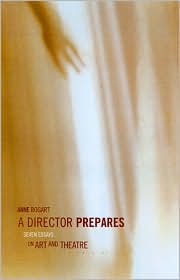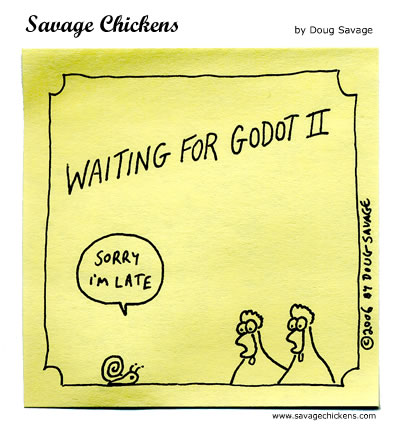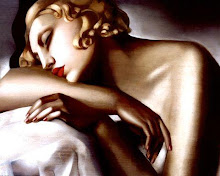Alright, I'm sick of monologues. Seriously.
I'm sick of seeing them done, I'm sick of the torturous process it is to pick one out, I'm sick of the falsity that comes out of doing a monologue for an audition.
All a monologue tells me is if you know how to tell a story, which is important, yes. But a monologue doesn't tell me if you are going to work off the unexpected gifts that your partner gives you in a scene. It doesn't tell me that you know how to listen and truly justify your lines based on what has happened before it. It doesn't tell me whether or not you have a sense of the character that I'm looking to cast you in.
I mean in a way they have their purpose, but not all good monologists are great actors, and not all great actors are great at delivering a monologue. I guess that's why I hate seeing them done, because for me the most beautiful moments on stage involve at least two people coming to a realization about who they are and where they've come from.
Sorry, this is just a little pre-audition venting. Not that I really have a solution to this problem for when I'm involved in an audition for more than one theatre or director. I just wish there was a better way.
Shucks. ;P
3.29.2009
3.24.2009
A Director Prepares.

So the next show I'm directing starts rehearsing in June. I've technically already started my process because I've been reading scripts and deciding which ones I would like to do. I think I've settled on a night of 4 different shorts. Now is the time to focus on the plays and start breaking them down. I have one little step though that I like to do when I have a bit of time before rehearsals start.
The semester I interned at Intiman in Seattle, I had the pleasure of working under BJ Jones. He's the Artistic Director of Northlight Theater outside of Chicago. As an opening night present, he gave me a copy of Anne Bogart's book A Director Prepares. Every time I start to work on a show (and if I have the time) I like to sit down a re-read it. It reminds me that as an artist, my role is to ask questions of society. It reminds me that as a director, my role is to ask questions of my designers and actors. As a human being, my role is to as questions of myself.
This book keeps me hungry for the work ahead and reminds me that the act of creating is a violent act. Killing ideas that you once held so close in favor of something deeper or more specific. You indeed have to go all Medea and "kill your babies" as an acting teacher once told me.
Do you "dare to suck" in your art?
3.22.2009
Shakespeare & Twitter... Wha?
 So back in February this article was posted on Mashable about a Twitter version of Shakespeare's The Taming of the Shrew.
So back in February this article was posted on Mashable about a Twitter version of Shakespeare's The Taming of the Shrew. The idea was to tweet a scene per day, each character having their own Twitter stream, but the lines were cut down into 140 bite-sized chunks. From looking at the stream (they aggregated all posts with the hashtag #tots) they cut words down into the kind of twitter shorthand, so they could minimize the amount of tweets.
I think it's an interesting idea. It allows you to read it from a different perspective, a more passive one where the words come to you. On the other hand, the shorthand is a little hard to read and if you don't know the script or have one near you, it could be difficult to follow.
They were smart by aggregating all the tweets under #tots so that way the reader could get a birds-eye view.
I still kind of compare it like I compare a staged reading and a full production, reading it by tweets just isn't as good.
However, lets say you get a group of talented actors from all over the country and have them improv a new version of it over the net. Talk about an exciting and engaging experience, it's basically workshopping/improving a play over twitter. Get a talented playwright involved who can really harness what the actors tweet out and who knows what the possibilities could be.
What do you think? Am I off my rocker?
3.20.2009
Dream Roles.

So everyone has their dream roles right? Here's a list of a few of mine and why they intrigue me so much, in no particular order of course.
1. Martha, Who's Afraid of Virginia Woolf? by Edward Albee - Who wouldn't want to play one of the craziest, out-of-control bitches in modern theatre? Yet she is so fragile underneath it all. She has one person who knows the real her, yet she wears her heart on her sleeve.
2. Miss Julie, Miss Julie by August Strindberg - I love that the tables flip on her. She goes from being charge to completely helpless and doesn't understand how to handle that because she isn't used to it. Also, the challenge of playing someone who is pushed so far that she sees taking her own life as the only option is something that you either step up to as an actor, or you just shouldn't do the role.
3. Medea, Medea by Euripides - Do I really need to say anything?
4. Tamora, Titus Andronicus by William Shakespeare - On the flip side I'd also love to play Lavinia, but if I had the choice I'd take Tamara in a heart beat. She's seems so heartless on the surface, but honestly she's fueled by revenge, and a rightful revenge at that. Her sons are another matter entirely though.
5. Saint Monica, The Last Days of Judas Isacariot by Stephen Adly Gurgis - I don't think I would be the normal choice for Saint Monica, but would I really be for any of these roles I've picked? Saint Monica is tough & gruff, she doesn't pull up with bullshit. That's not to say that she doesn't have a heart though and a big one at that. Her interaction with Judas cuts through to my core.
6. Natasha, Three Sisters by Anton Chekov - We did scene work my junior year in college and I love how crazy Natasha can be when you find those moments to really let go and then how you recover. She is someone that lives in extremes and though she's the "bitch" of the play, I like the challenge that she brings.
7. Antigone, Antigone by Sophocles or Jean Anouilh - Honestly, I love both portrayals of Antigone. She's strong and a martyr for sure. She will allow herself to die for what she believes in, how could I not be attracted to that?
8. Ophelia, Hamlet by William Shakespeare - Ever since high school I've wanted to play her. Since I'm a larger body type I really think it adds a new level as to why Hamlet wants her. It takes it past a superficial level into finding a true connection between the two.
9. Helen, Fat Pig by Neil LaBute - Out of any character on this list, she is probably the one that on the surface I have the most in common with, but I don't know how to tap into her because everything is so similar. For me, she's a challenge because she would force me to really examine myself and the relationship to my body on a level that I don't think I've explored or have been willing to.
10. Lin, Cloud 9 by Caryl Churchill - Okay so I never realized how much I would love to play this character until working on a production of this show recently. I love her depth and how her true nature lies in what she does as opposed to what she says about herself. She is one of those character's whose motives are implied, nothing is that upfront and I love that about her.
I guess I chose all of these roles because I think that between my body type, my perspective & my history, I'd have something new to bring to the table to each role.
So what's your 10?
3.18.2009
Mary Zimmerman on creating scripts.
Love her! Her trust in her ensemble is incredible. I think that trust between actors & directors is so crucial to creating an amazing piece of theatre. Thanks to Mary for reminding me as I prepare for the next show!
3.16.2009
American Theatre = Walmart

There was an interesting blog post that I saw tweeted out by @balttheatre, the source being a friend of mine, Cole Matson. (link to article)
The author quoted Beth Leavel's keynote at Southeastern Theatre Conference:
"All I know is that if I want to work in Chicago, I have to be in New York; if I want to work in Seattle, which is a great theatre town, I have to be in New York; if I want to work in my home town of Raleigh, I have to be in New York."
He goes on to discuss how American theatre is turning into Wal-Mart and NYC is our distribution center. Theatre schools are teaching students that if they want to work they need to go to NYC. Or at least that's what I got from it.
At least in my experience, it wasn't my school that taught me that, it was the regional theaters themselves. I trained in Seattle and we were afforded the opportunity to go to the regional theaters at least twice a year (I think it was actually more than that). My classmates and I quickly noticed that a lot of the bios had NY credits. This wasn't the case EVERY time, but it happened a lot. In the comments of the post there was an interesting discussion about how it needs to be the responsibility of the AD or MD/ED to have the vision and care enough about the artistic community to cast local talent. I agree completely, though I suggest a mix of talent from other cities (not just NYC) intertwined with local talent. This lets your audience experience a mix of local actors they love, while giving them something new to chew their teeth on.
When I was at On the Boards (OtB)in Seattle, their programming was dedicated to showcasing acts from the Northwest as well as bringing talent from around the world to Seattle audiences. Granted they were a type of performance house that supported contemporary work that pushes artistic boundaries, but their spirit was one that I think regional theatres can take a clue from.
How many times do you go to the theatre and see only actors from out of town?
3.14.2009
It's all Greek to me.

So this week I scored $10 tickets to see Ion at The Shakespeare Theatre in DC at their newer Sidney Harman Hall space across from the Verizon Center.
Umm... Wow. What an incredible space. It's large and intimate all at the same time. Structured like a Greek theatron, with the slant down towards the stage being severe. Perfect to see a Greek tragedy in!
I enjoyed the show. I really appreciated Director Ethan McSweeny's use of song with the chorus, which is totally traditional, but he used modern melodies in a way that draws you in. His direction was very purposeful.
I did feel as though there were some inconsistencies in acting styles. All the acting was great, but when you have a very traditional portrayal of a Greek woman (Creusa), mixed with the more modern style of the actor that played Ion, it can start to feel as though they aren't necessarily in the same world.
I loved the director's use of puppetry, I think it's an art form that can be used to solve problems on the stage in a simplistic & beautiful way, especially when you have amazing puppeteers.
Anyways, I enjoyed it. Here's a video from the Shakespeare Theatre Company about Ion.
Labels:
Euripides,
Ion,
review,
Shakespeare Theatre Company
It's about the work.
I had a discussion with an actor friend of mine who is having a hard time in the show they are currently doing. My advice was with whatever is going on, the focus should always be about the work. It reminds me of a quote from Stanislavski:
It's true though. No matter what's going on in your life, if you let that come into the theater your work will suffer. So no matter what happens, just focus on the job you have to get done. Think about the rest later & do what you have to do.
Very stoic, I guess.
"Never come into the theatre with mudd on your feet. Leave your dust and dirt outside. Check your little worries, squabbles, petty difficulties with your outside clothing -- all the things that ruin your life and draw your attention away from your art."
From Stanislavski's Building A Character. Thanks to Hal Ryder for making me read that chapter Freshman year at Cornish.
It's true though. No matter what's going on in your life, if you let that come into the theater your work will suffer. So no matter what happens, just focus on the job you have to get done. Think about the rest later & do what you have to do.
Very stoic, I guess.
3.01.2009
Stages.
So I've been noticing that there are four stages whenever you open a show. Here's my theory. This is based on a four week run, but can be adapted to weekend & longer runs as well.
Week 1 - Opening weekend. This is the excited/nervous/tired week. Everyone has been working so hard, pushing their way through hell week to get to this. Where people actually get a chance to get a little bit of satisfaction as a pay off to all the work they've done. It's that exhale after a week of inhaling.
Week 2 - Silly time. Finally you've gotten some rest and this is when the focus can be a little lacking. It's fun, but the experience is unique. The energy can live backstage and die when the actor's take the stage. This week is the hardest to keep yourself connected to what you're working on. Important to know if this is true for you so you can come up with ways to combat this.
Week 3 - The real work. This tends to be the week when people make leaps and bounds in their discoveries. Each show is a little different and you really get a chance to build upon what you've done each night.
Last Week - Senioritis/Bittersweet. Now this week depends on your relationship with the show. Some shows you love doing, some you are just ready for them to be over. There tends to be a freeness to this week in the work that is done, whether that be for good or bad. If you have an attachment to the show, your work can really reach a new level, while if your waiting for the show to just end, your work can become heavy.
Now of course these aren't rules, these are just things that I have seen. What do you think?
Week 1 - Opening weekend. This is the excited/nervous/tired week. Everyone has been working so hard, pushing their way through hell week to get to this. Where people actually get a chance to get a little bit of satisfaction as a pay off to all the work they've done. It's that exhale after a week of inhaling.
Week 2 - Silly time. Finally you've gotten some rest and this is when the focus can be a little lacking. It's fun, but the experience is unique. The energy can live backstage and die when the actor's take the stage. This week is the hardest to keep yourself connected to what you're working on. Important to know if this is true for you so you can come up with ways to combat this.
Week 3 - The real work. This tends to be the week when people make leaps and bounds in their discoveries. Each show is a little different and you really get a chance to build upon what you've done each night.
Last Week - Senioritis/Bittersweet. Now this week depends on your relationship with the show. Some shows you love doing, some you are just ready for them to be over. There tends to be a freeness to this week in the work that is done, whether that be for good or bad. If you have an attachment to the show, your work can really reach a new level, while if your waiting for the show to just end, your work can become heavy.
Now of course these aren't rules, these are just things that I have seen. What do you think?
Subscribe to:
Posts (Atom)




